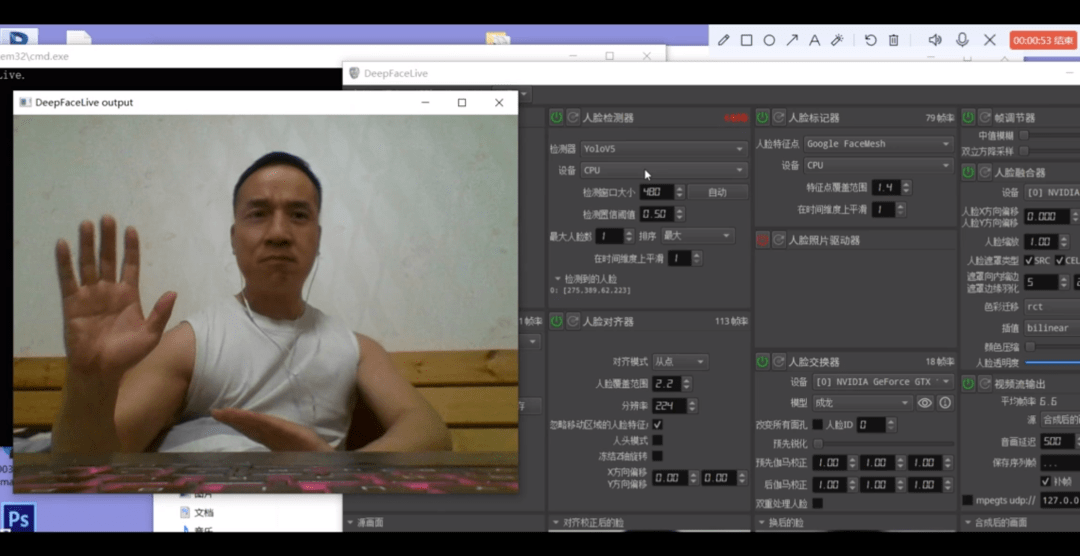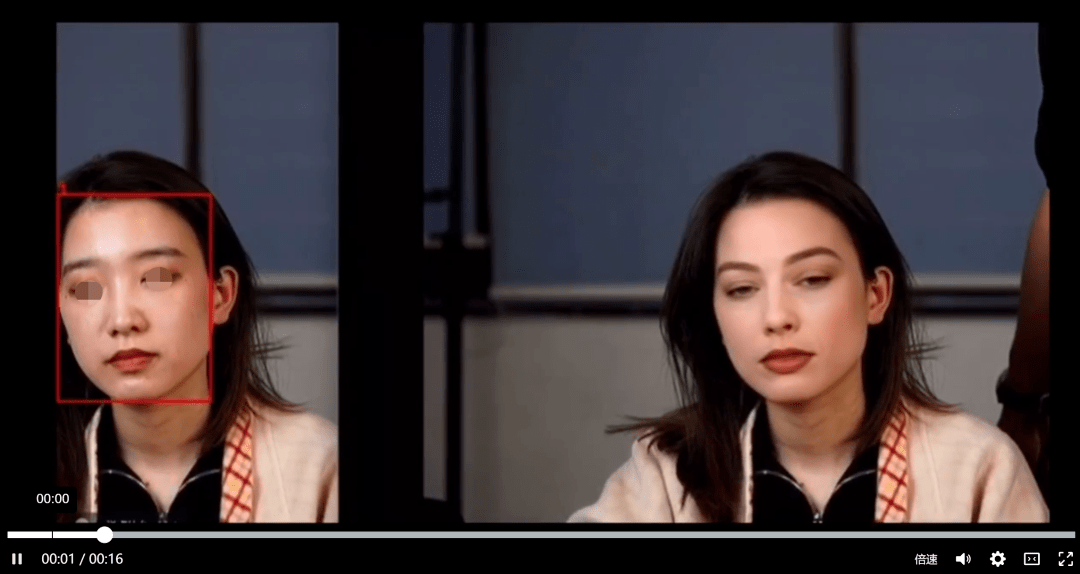 Technology peripherals
Technology peripherals
 AI
AI
 Are there many 'celebrity faces' in the live broadcast room? Be careful, it's AI face-changing
Are there many 'celebrity faces' in the live broadcast room? Be careful, it's AI face-changing
Are there many 'celebrity faces' in the live broadcast room? Be careful, it's AI face-changing
This article is reproduced from [Voice of China, China Central Radio and Television];
"Face-changing" is realized through artificial intelligence technology, which has developed to the point where the video picture can be dynamically modified in real time during the live broadcast. Recently, some tutorials claim that you can use some related software to replace your own face with the face of a celebrity artist to improve the effect of live streaming. This practice may be suspected of infringing on the artist's right to portrait and reputation, and use for commercial purposes may also be suspected of false publicity, legal experts remind.
“AI face-changing star live broadcast to bring goods” tutorial is popular
Lawyer: Possibly suspected of infringement and false publicity
The reporter browsed relevant AI face-changing live broadcast tutorials online and found that these tutorials were disseminated through videos, articles, etc., and provided download channels for face-changing live broadcast tools. Some require payment, and some can be obtained through likes, follows, and comments.
The person who posted the tutorial claimed that real-time face changing software can help users easily change their faces and create special effects live broadcast rooms, which can greatly help attract traffic and promote sales. They also said that there are many models to choose from, which are named after Chinese and foreign stars, film and television characters or political and business celebrities.
In a video showing the live broadcast effect of face-swapping, after the user loads a model named "Jackie Chan" into the relevant software, the person in front of the camera has facial features similar to Jackie Chan in the live broadcast screen, but the face shape is the same as Jackie Chan's. The hairstyle remains the same. The reporter found that when the user tilted his head or changed his expression, the facial features moved naturally and smoothly. Only when the palm passed across the face, there were obvious flaws.

Lawyer Yue Qishan, senior partner of Beijing Yue Cheng Law Firm, said face-changing live broadcasts are used for public dissemination and may be suspected of infringing on the portrait rights of relevant celebrities and artists. If it involves commercial activities such as live streaming, it will become an aggravating circumstance.
Yue Qishan: As long as one's own face is replaced by a celebrity's face through technical means during the live broadcast without the consent of the portrait rights holder, this is an infringement of the celebrity's portrait. The consequences may vary depending on the situation. Even if it is just entertainment and does not involve profit-making activities, it is still an infringement. When celebrity portraits are used for live broadcasts to promote goods, this is considered a commercial practice and the amount of compensation will certainly be taken into consideration. If the degree of subjective malignancy and fault is higher, and a profit is made, the amount of compensation may be larger.
Ms. Yuan, who is engaged in publicity work in a well-known artist studio, said she is worried that related technologies will be used to promote fake and shoddy products, harming the rights and interests of consumers and affecting the image of artists.
Ms. Yuan thinks that if you don't pay attention to the distinction, it is easy to mistake him for a real star, which makes her feel quite scary. If the items they buy are wrong when they get them back, or there are some more serious problems, consumers will feel like, 'I bought this thing looking at so-and-so's face', or 'I bought into someone else's face'. I bought it at the live broadcast room'.
How to strengthen supervision of AI face-changing technology?
Lawyer: It is recommended that platforms proactively identify relevant content
The reporter noticed that some live broadcasts using face-changing technology will not directly mention the names of relevant celebrities and artists, but they will not actively declare or deny it. Lawyer Yue believes that this behavior is suspected of fraud or false publicity, making the public mistakenly think that celebrities are bringing goods. If the quality of the goods itself is not good, or the anchor’s words or actions during the delivery process cause the public to have a negative evaluation of the celebrity whose face has been changed, the celebrity can claim liability for infringement of reputation rights.
Yue Qishan: This kind of portrait infringement is a matter for the portrait right holder to claim civil liability from the judicial authorities. If there is false advertising and unfair competition, the market regulatory authorities will impose administrative penalties.
As an artist publicity staff member, Ms. Yuan believes that the cost of collecting evidence of relevant behaviors and safeguarding rights and interests is quite expensive. The use of facial features of celebrity artists, whether or not they are named, will have an impact on copyright infringement. For some users, a line of small text may not necessarily serve as a reminder.
Ms. Yuan: In fact, the cost of safeguarding rights is very high, and the effect may not be that good. It is often difficult to find the person who infringes the rights. If the celebrity artist I manage encounters this situation, we cannot send legal letters every day.

Recently, some platforms and companies have issued "Platform Specifications and Industry Initiatives on Artificial Intelligence Generated Content", which clearly prohibits the use of generative artificial intelligence technology to create and publish infringing content, including but not limited to portrait rights, intellectual property rights, etc. , once discovered, the platform will be severely punished; it also puts forward requirements such as "Publishers should prominently mark content generated by artificial intelligence to help other users distinguish virtuality from reality" and "Publishers must be responsible for the corresponding consequences of content generated by artificial intelligence."
Lawyer Yue suggested that platforms can more proactively identify relevant content and label it to limit infringement.
Yue Qishan suggested that platforms should monitor the use of technical means to change facial features or perform celebrity face swaps. Platforms have the responsibility to take restrictive measures to stop alleged infringements.
The above is the detailed content of Are there many 'celebrity faces' in the live broadcast room? Be careful, it's AI face-changing. For more information, please follow other related articles on the PHP Chinese website!

Hot AI Tools

Undresser.AI Undress
AI-powered app for creating realistic nude photos

AI Clothes Remover
Online AI tool for removing clothes from photos.

Undress AI Tool
Undress images for free

Clothoff.io
AI clothes remover

Video Face Swap
Swap faces in any video effortlessly with our completely free AI face swap tool!

Hot Article

Hot Tools

Notepad++7.3.1
Easy-to-use and free code editor

SublimeText3 Chinese version
Chinese version, very easy to use

Zend Studio 13.0.1
Powerful PHP integrated development environment

Dreamweaver CS6
Visual web development tools

SublimeText3 Mac version
God-level code editing software (SublimeText3)

Hot Topics
 1386
1386
 52
52
 I Tried Vibe Coding with Cursor AI and It's Amazing!
Mar 20, 2025 pm 03:34 PM
I Tried Vibe Coding with Cursor AI and It's Amazing!
Mar 20, 2025 pm 03:34 PM
Vibe coding is reshaping the world of software development by letting us create applications using natural language instead of endless lines of code. Inspired by visionaries like Andrej Karpathy, this innovative approach lets dev
 Top 5 GenAI Launches of February 2025: GPT-4.5, Grok-3 & More!
Mar 22, 2025 am 10:58 AM
Top 5 GenAI Launches of February 2025: GPT-4.5, Grok-3 & More!
Mar 22, 2025 am 10:58 AM
February 2025 has been yet another game-changing month for generative AI, bringing us some of the most anticipated model upgrades and groundbreaking new features. From xAI’s Grok 3 and Anthropic’s Claude 3.7 Sonnet, to OpenAI’s G
 How to Use YOLO v12 for Object Detection?
Mar 22, 2025 am 11:07 AM
How to Use YOLO v12 for Object Detection?
Mar 22, 2025 am 11:07 AM
YOLO (You Only Look Once) has been a leading real-time object detection framework, with each iteration improving upon the previous versions. The latest version YOLO v12 introduces advancements that significantly enhance accuracy
 Best AI Art Generators (Free & Paid) for Creative Projects
Apr 02, 2025 pm 06:10 PM
Best AI Art Generators (Free & Paid) for Creative Projects
Apr 02, 2025 pm 06:10 PM
The article reviews top AI art generators, discussing their features, suitability for creative projects, and value. It highlights Midjourney as the best value for professionals and recommends DALL-E 2 for high-quality, customizable art.
 Is ChatGPT 4 O available?
Mar 28, 2025 pm 05:29 PM
Is ChatGPT 4 O available?
Mar 28, 2025 pm 05:29 PM
ChatGPT 4 is currently available and widely used, demonstrating significant improvements in understanding context and generating coherent responses compared to its predecessors like ChatGPT 3.5. Future developments may include more personalized interactions and real-time data processing capabilities, further enhancing its potential for various applications.
 Best AI Chatbots Compared (ChatGPT, Gemini, Claude & More)
Apr 02, 2025 pm 06:09 PM
Best AI Chatbots Compared (ChatGPT, Gemini, Claude & More)
Apr 02, 2025 pm 06:09 PM
The article compares top AI chatbots like ChatGPT, Gemini, and Claude, focusing on their unique features, customization options, and performance in natural language processing and reliability.
 How to Use Mistral OCR for Your Next RAG Model
Mar 21, 2025 am 11:11 AM
How to Use Mistral OCR for Your Next RAG Model
Mar 21, 2025 am 11:11 AM
Mistral OCR: Revolutionizing Retrieval-Augmented Generation with Multimodal Document Understanding Retrieval-Augmented Generation (RAG) systems have significantly advanced AI capabilities, enabling access to vast data stores for more informed respons
 Top AI Writing Assistants to Boost Your Content Creation
Apr 02, 2025 pm 06:11 PM
Top AI Writing Assistants to Boost Your Content Creation
Apr 02, 2025 pm 06:11 PM
The article discusses top AI writing assistants like Grammarly, Jasper, Copy.ai, Writesonic, and Rytr, focusing on their unique features for content creation. It argues that Jasper excels in SEO optimization, while AI tools help maintain tone consist



